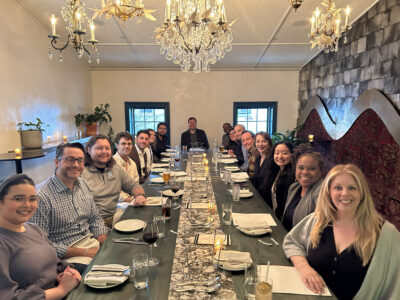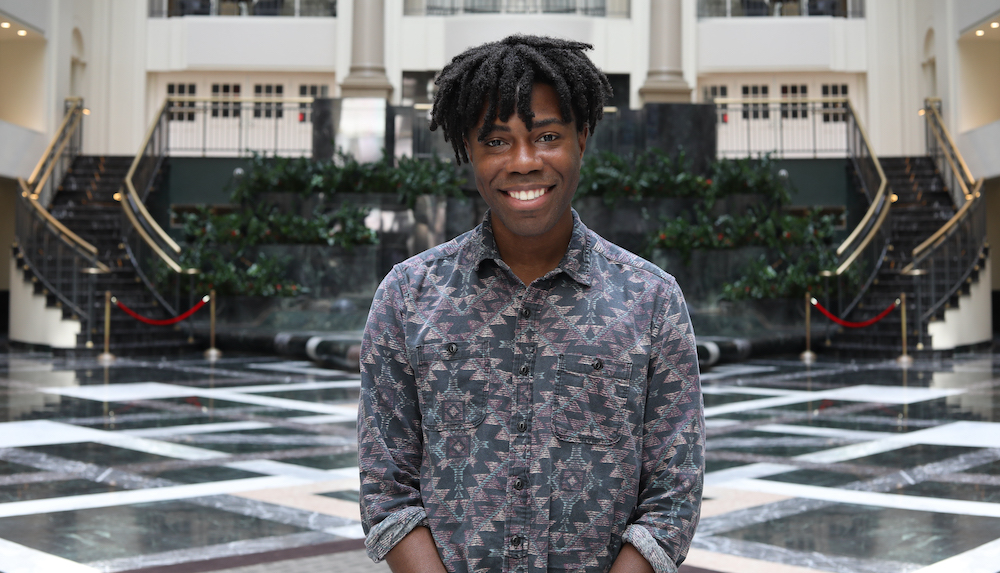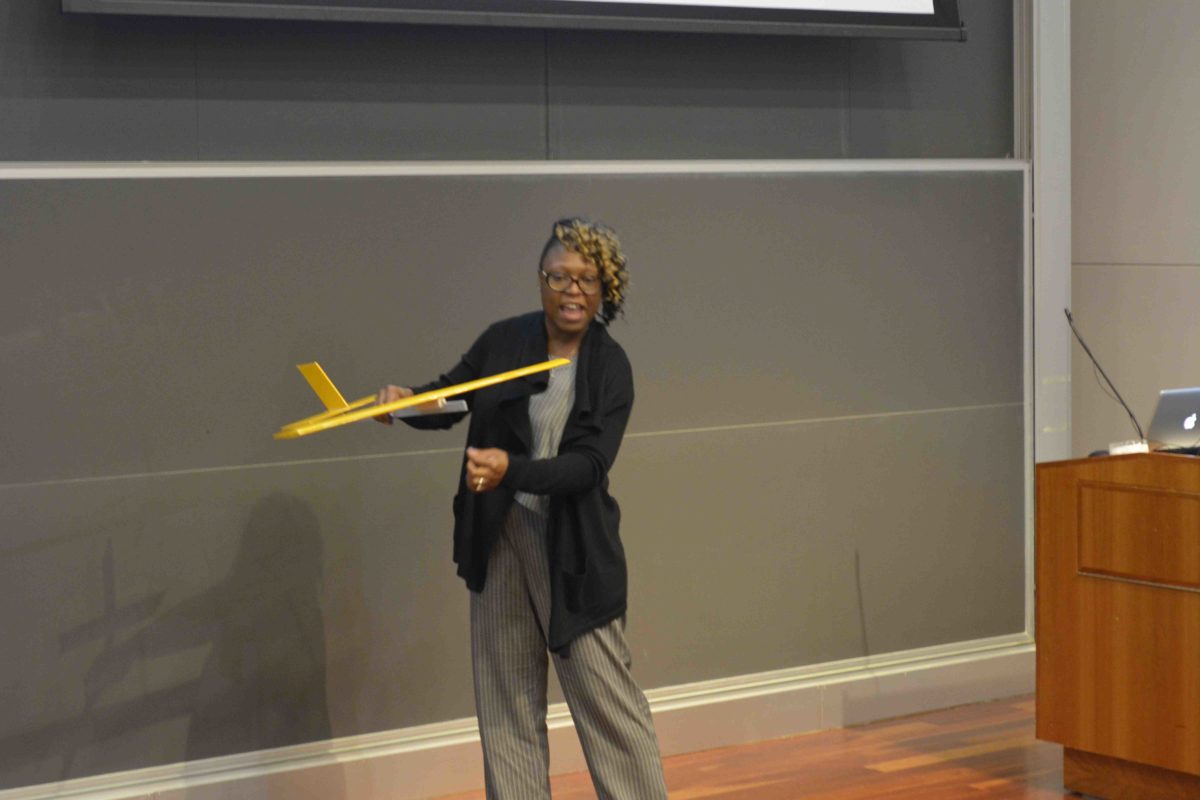Middle-school math teacher Cashonna Thomas spent the summer researching the aerodynamics of two different drones, alongside a Penn Ph.D.
Thomas, who’s been a teacher for the last decade, then used that research to develop a curriculum on aspect ratio for her students at North Philly public school Dunbar Promise Academy.
Thomas was one of 10 School District teachers who completed Research Experience for Teachers (RET), a National Science Foundation-backed program with Penn’s GRASP robotics lab. The program trains middle school teachers how to do graduate-level research in robotics and engineering with the hope that teachers will foster a love for STEM (science, technology, engineering and math) in their students this fall. The teachers presented their research last week at Penn’s Levine Hall at 33rd and Walnut.
RET is a response to what some have called the “STEM crisis.” Stats from the Bureau of Labor Statistics say that in order to meet industry demand, the United States must add 1 million more STEM professionals by 2022, and there’s been a push from the Obama administration to get more Black students into STEM. Penn’s RET program, funded by a three-year, $600,000 federal grant, seems to be tackling that issue in part by focusing exclusively on training School District teachers, instead of teachers from across the region. Drexel has done a similar program, though it wasn’t exclusively focused on School District teachers like this one.
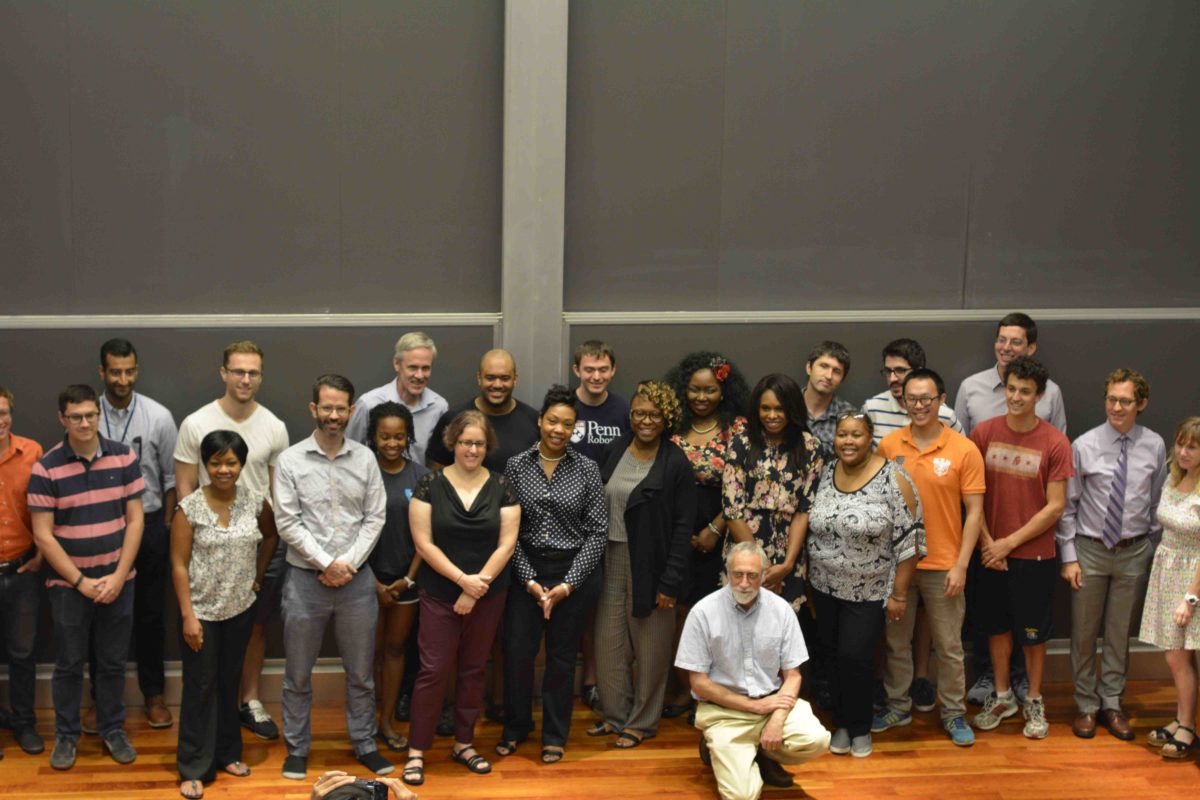
The RET crew on final presentation day. (Photo by Donte Kirby)
For six weeks this summer, Thomas and the rest of her cohort delved headfirst into robotics and engineering topics they had no experience in. (Each teacher received an $8,000 stipend, plus $2,000 to help get the materials needed to make their curricula a reality.) When they came out the other side, they had a new appreciation for engineers and a curriculum that could plant the germ in a student that grows into an engineer.
“I’ve thought about doctors and lawyers but never thought I might have the next engineer in my class,” Thomas said. “I might have the next astrophysicist.”
GRASP Lab Associate Director for Education and Outreach Dan Ueda worked with Penn engineering professor Daniel Koditschek to tailor the program to middle school STEM teachers, whom Ueda thinks are overlooked when it comes to this kind of professional development.
“If you’re spending all your time focusing on high school, you’re doing it too late,” Ueda said.
Ueda recognizes middle schools as a critical time of development for STEM skills, as well as the right time to get students interested in engineering careers.
The program also helped teachers see the practical applications of STEM.
I think it is important for political purposes to show how incredibly hard our teachers work and how talented they are.
Jennifer Hannah-Parks, a science teacher from North Philly’s Thurgood Marshall School whose research focused on how to automate the delivery of goods using electromagnetism and microrobots, recalls learning algorithms and equations when she was in middle school but never seeing their practical application — something robotics and engineering in the classroom provides.
“I think the sooner our kids start to see the relationship [between science and its real world application] the stronger they’ll be, the better thinkers they’ll be,” said Hannah-Parks, who’ll be going into her 21st year of teaching this fall. Based on her research this summer, she plans to have her students conduct electromagnetic experiments in her classroom.
For Ueda, the topic of professional development for teachers is close to his heart. As a School District math and physics teacher for the last decade, most recently at Central High School, where he coached its robotics team, he felt he could do professional development better.
“We didn’t just want to hand [teachers] a curriculum and say, ‘Take this and apply it to your classroom because this will prepare students to be engineers,’” he said.
He stressed the importance of teaching teachers “in the way that we want teachers to teach our students.”
“One of the goals of this program is to create a model for a different way to do professional development,” he said. “To have teachers involved in their own learning. Instead of just giving it to them, we wanted them to create it on their own. The same way we want their students to create.”
The program also served as a way to showcase the talent of the District’s teachers and to give them the professional development they deserve, he said.
“A great deal is made of the lack of District teachers’ devotion, skills and interest in improving their craft,” he later wrote to Technical.ly in an email.
He continued:
I think it is important for political purposes to show how incredibly hard our teachers work and how talented they are. In this program, a fairly random collection of 10 middle school teachers performed real graduate-level research in the field of engineering. This was no experience for the light of heart and their final presentations are proof of that. The teachers in the District are outstanding professionals and I wanted to show that to be the case. It’s about time we started treating them that way.
If you’re a School District teacher, you can apply for next summer’s program in February.
Donte Kirby is a 2020-2022 corps member for Report for America, an initiative of The Groundtruth Project that pairs young journalists with local newsrooms. This position is supported by the Robert W. Deutsch Foundation.Join the conversation!
Find news, events, jobs and people who share your interests on Technical.ly's open community Slack

Philly daily roundup: A better coffee supply chain; Philly Tech Week returns; Apply to Pennovation Accelerator
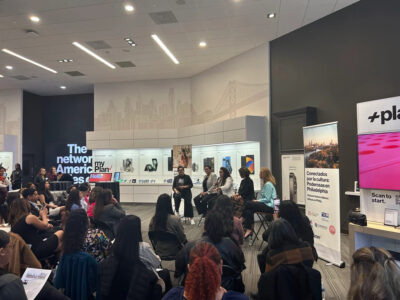
Philly daily roundup: Startups want office culture; New Venture Lab cohort; Penn Med's new AI leader

What AI means for the future of SaaS: Reality vs. hype
